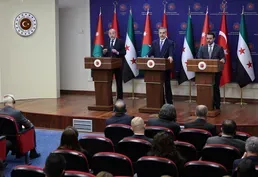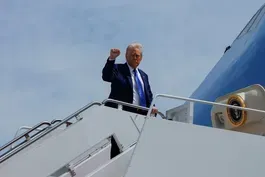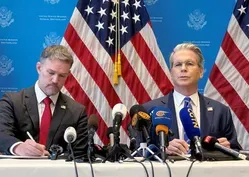
Last living American hostage held in Gaza released by Hamas
Clip: 5/12/2025 | 9m 1sVideo has Closed Captions
Last living American hostage released by Hamas as Netanyahu plans for Gaza's reoccupation
The final living American hostage held by Hamas is free. Edan Alexander entered Israel from Gaza in a deal made directly between Hamas and the United States. His release came as Israeli Prime Minister Benjamin Netanyahu went further than before on his plans for Gaza, calling for its reoccupation. Nick Schifrin reports.
Problems with Closed Captions? Closed Captioning Feedback
Problems with Closed Captions? Closed Captioning Feedback
Major corporate funding for the PBS News Hour is provided by BDO, BNSF, Consumer Cellular, American Cruise Lines, and Raymond James. Funding for the PBS NewsHour Weekend is provided by...

Last living American hostage held in Gaza released by Hamas
Clip: 5/12/2025 | 9m 1sVideo has Closed Captions
The final living American hostage held by Hamas is free. Edan Alexander entered Israel from Gaza in a deal made directly between Hamas and the United States. His release came as Israeli Prime Minister Benjamin Netanyahu went further than before on his plans for Gaza, calling for its reoccupation. Nick Schifrin reports.
Problems with Closed Captions? Closed Captioning Feedback
How to Watch PBS News Hour
PBS News Hour is available to stream on pbs.org and the free PBS App, available on iPhone, Apple TV, Android TV, Android smartphones, Amazon Fire TV, Amazon Fire Tablet, Roku, Samsung Smart TV, and Vizio.
Providing Support for PBS.org
Learn Moreabout PBS online sponsorshipAMNA NAWAZ: Tonight, the final living American hostage held by Hamas is free.
Edan Alexander entered Israel from Gaza earlier today in a deal made directly between Hamas and the United States.
His release came as Israeli Prime Minister Benjamin Netanyahu went further than before on his plans for Gaza, calling for its reoccupation, and as President Trump left today for his four-day trip to the region.
Nick Schifrin begins with the hostage release and an emotional reunion in Israel.
NICK SCHIFRIN: Five hundred and eighty-four days.
Edan Alexander is free in his mother's arms, the Israeli-American soldier reunited with his family.
He was kidnapped on October 7, 2023, when Hamas and its supporters rushed into Israel and overran a nearby military base.
That day, he was just 19 years old, now 21, a native of New Jersey, where in Tenafly today, they cheered the moment they saw a native son released.
And the moment Yael Alexander got to speak to him.
YAEL ALEXANDER, Mother of Hamas Hostage: They just released a photo of you.
And you look unbelievable.
Wow, you look beautiful.
I love you so much.
I love you.
And I'm going to see you very soon, very soon.
NICK SCHIFRIN: That photo posted by Al-Jazeera, Alexander, a Red Cross officer, and Hamas gunman.
But today's release does not include nearly 60 non-American hostages still held by Hamas.
Israel and the U.S. believe as few as 20 are still alive.
Their being left behind has sparked anger.
In Tel Aviv's Hostage Square today, the mother of Israeli hostage Matan Zangauker praised President Trump and attacked Israeli Prime Minister Benjamin Netanyahu.
EINAV ZANGAUKER, Mother of Hamas Hostage: Mr. President, sir, all of the Israeli people are behind you.
End this war.
Bring them all home.
(through translator): Netanyahu, I won't let you kill my son.
The people of Israel will not let you kill our loved ones.
The people of Israel will not forgive you for these crimes of abandonment.
NICK SCHIFRIN: But Netanyahu today took partial credit with Trump.
BENJAMIN NETANYAHU, Israeli Prime Minister (through translator): This was achieved thanks to military pressure and the diplomatic pressure exerted by President Trump.
This combination is a winning formula.
NICK SCHIFRIN: Tonight, Netanyahu went further, telling wounded soldiers that Israel had made a decision to reoccupy Gaza.
"Things have changed," he said.
"A decision has been made to go all the way.
We will conquer Gaza and our security control there will be permanent."
In Gaza, Israel has blocked all aid for two months, deepening the deprivation.
Today, an umbrella organization of U.N. and international humanitarian groups declared that nearly half-a-million people face catastrophic hunger and are at risk of famine.
In the next 11 months, more than 70,000 children are expected to be acutely malnourished.
The U.N. has recently run out of food, and residents say what little food is left in the markets is overpriced.
MUNIR FAQAW, Khan Yunis Resident (through translator): We are starved.
Children are dying.
Children need nutrition.
There is none of that.
NICK SCHIFRIN: The U.S. is trying to put together an independent effort to resupply Gaza using private contractors and private security, but aid agencies do not believe that will work, Amna, either in the time or the scale that's needed.
AMNA NAWAZ: Nick, let's begin with that news from Netanyahu.
What has been the reaction in Israel to his statement that they want to reoccupy, calling for permanent control of Gaza?
NICK SCHIFRIN: So he spoke to a group called the War Wounded Forum for Decisive Victory.
They confirmed Netanyahu's comments to me, but the prime minister's officials have not actually explain exactly what he meant.
But the statement comes about one week after Israel said it was going to change its military strategy in Gaza, away from targeted raids in certain areas in Gaza to actually holding areas and clearing areas, and then forcibly moving the population of Northern Gaza to Southern Gaza, all of which will require tens of thousands of additional reservists that are being called up right now throughout Israel.
And all of that will bring more pain to the people of Gaza, Says Hussein Ibish of the Arab Gulf States Institutes in Washington.
HUSSEIN IBISH, Senior Resident Scholar, Arab Gulf States Institute: Israel's plans are going to be an absolute catastrophe for the people of Gaza.
The majority, the non-Hamas majority of the 2.2 million Palestinians, will be herded into a tiny enclave in Gaza, where they may or may not get enough food, medicine, water, et cetera to survive.
Meanwhile, the most extreme and militant factions in Hamas will get a war that they have been yearning for.
NICK SCHIFRIN: But Israeli officials, Amna, say that military pressure is the only way to get Hamas to agree to any deal when it comes to the release of the hostages.
And they indicate the next stage of the war could start as soon as this coming weekend after President Trump leaves the region.
AMNA NAWAZ: Nick, among your sources, and staying in Israel here, is there any concern about the decisions that President Trump seems to be making here without any kind of coordination with Prime Minister Netanyahu?
NICK SCHIFRIN: There is absolutely concern among the officials I speak to, mainly because of three decisions that the president has made with Steve Witkoff, one of his most senior aides that you saw in the video there.
One is the release of Edan Alexander, which Witkoff led directly with Hamas over Israeli officials' heads, number two, a U.S. cease-fire with the Houthis in Yemen, despite the fact that the Houthis have not agreed to stop fire at Israel, in fact, recently fired at Israel again, and U.S. direct talks with Iran, something that was announced by President Trump while Netanyahu was actually in the Oval Office.
A U.S. official tells me this.
On the one hand, there's no daylight between Netanyahu and -- Bibi and President Trump, in the sense that President Trump has not criticized Netanyahu's plans for Gaza, at least not publicly.
And last week, Trump met with Ron Dermer, a Netanyahu top aide for many years.
That's an unusual level of coordination with a minister from a foreign government by the president.
But, on the other hand, this U.S. official says there's definitely a different approach that President Trump and Prime Minister Netanyahu has.
This official says President Trump's been vocally anti-war and is trying to make deals that end the wars in Gaza and prevent a war in Iran, whereas Netanyahu has talked about military action in Gaza, in Lebanon, and floated the idea of military action in Iran.
And the official warns me that, as long as this war in Gaza continues, the more likely it is that President Trump will see Netanyahu as unwilling to compromise and make the kinds of deals that are clearly the priority of President Trump going into this Middle East trip, which, notably, by the way, does not include a stop in Israel.
AMNA NAWAZ: Tell us more about that trip.
These kinds of presidential trips usually have some sort of big announcements attached to them.
What should we expect from this one?
NICK SCHIFRIN: Yes, we call them deliverables in the news business, right?
President Trump is on the way to Saudi Arabia right now, where a senior official there tells me that the deals announced tomorrow during this trip will include artificial intelligence, space technology, and energy, including a reference of future U.S. support for civilian nuclear energy in Saudi Arabia.
But much of the trip, this official and other officials tell me, will be focused on business deals.
And these will be billed as enormous investments in the U.S. and into the U.S. economy.
And that approach, according to analysts I speak to, works for Gulf leaders.
They need U.S. military assistance.
They need U.S. engagement in the region.
And they see flattering Trump, an investment in America, as the best way to do that.
And they welcome how Trump administration officials have taken a more realist approach to the region, says Jon Alterman of the Center for Strategic and International Studies.
JON ALTERMAN, Center for Strategic and International Studies: They don't talk about democratization.
They don't talk about human rights.
They don't talk about humanitarian assistance.
They don't talk about all sorts of things that a lot of regional governments feel are naive and weaken them in terms of security in the name of rights.
And this more transactional president narrows the area of interest of the United States in ways they feel is in their interest and gives them something to work with.
NICK SCHIFRIN: But, Amna, what will not happen this week, any meetings between Trump and Putin in Saudi Arabia, something that Saudi officials hoped would happen.
AMNA NAWAZ: All, Nick Schifrin, thank you very much.
NICK SCHIFRIN: Thank you.
News Wrap: PKK will disband in peace deal with Turkey
Video has Closed Captions
Clip: 5/12/2025 | 6m 57s | News Wrap: PKK will disarm and disband in peace deal with Turkey (6m 57s)
Qatar gifting jet to Trump raises ethical and legal concerns
Video has Closed Captions
Clip: 5/12/2025 | 5m 8s | Qatar gifting Trump $400M luxury jet raises ethical and legal concerns (5m 8s)
Tamara Keith and Amy Walter on Trump's tariff negotiations
Video has Closed Captions
Clip: 5/12/2025 | 6m 52s | Tamara Keith and Amy Walter on Trump's tariff negotiations (6m 52s)
U.S. and China roll back tariffs as they try to reach deal
Video has Closed Captions
Clip: 5/12/2025 | 4m 55s | U.S. and China roll back steep tariffs as they try to reach a larger deal (4m 55s)
What's next for Trump's trade war after pausing tariffs
Video has Closed Captions
Clip: 5/12/2025 | 6m 45s | What's next for Trump's trade war after pausing tariffs with China (6m 45s)
What to expect after Trump demands lower drug prices
Video has Closed Captions
Clip: 5/12/2025 | 6m 33s | What to expect after Trump signs order demanding lower prices from drug companies (6m 33s)
White South Africans granted refugee status in U.S.
Video has Closed Captions
Clip: 5/12/2025 | 5m 57s | White South Africans arrive in U.S. after receiving refugee status from Trump (5m 57s)
Providing Support for PBS.org
Learn Moreabout PBS online sponsorshipSupport for PBS provided by:
Major corporate funding for the PBS News Hour is provided by BDO, BNSF, Consumer Cellular, American Cruise Lines, and Raymond James. Funding for the PBS NewsHour Weekend is provided by...

















